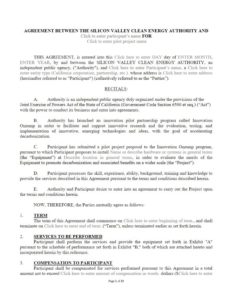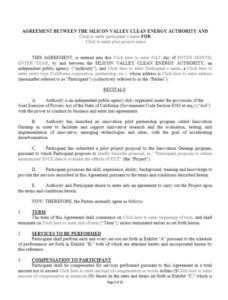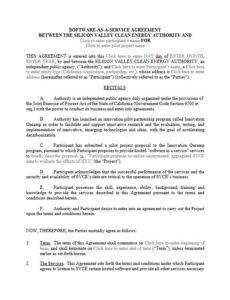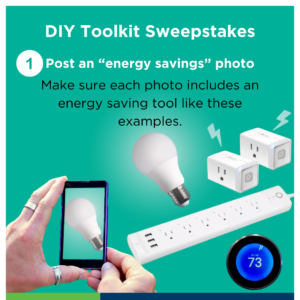Innovation Onramp
The Innovation Onramp program was launched to leverage SVCE’s unique position to engage and support the innovation ecosystem in addressing key technical, market and policy barriers to achieving deep decarbonization in our service territory & beyond.
The Innovation Onramp program was launched to leverage SVCE’s unique position to engage and support the innovation ecosystem in addressing key technical, market and policy barriers to achieving deep decarbonization in our service territory & beyond. The program supports one or more of the following stages of grant funding, which varies by application cycle:
- Stage 0: $5,000 – $20,000 for seed round projects
- Stage 1: $10,000 – $75,000 for proofs of concept
- Stage 2: $50,000 – $100,000 for demonstrations
The Spring 2021 Innovation Onramp application cycle is currently open for seed round proposals (Stage 0). The theme of the application round is building decarbonization solutions that reduce natural gas emissions in the built environment. Projects selected through this cycle will complement the strategies and programs already identified SVCE’s recently approved Building Decarbonization Joint Action Plan . Additionally, seed round projects that are selected for funding must have negligible SVCE staff resource impact.
Seed round applications require a short video pitch describing the proposed project, which will be shared publicly by SVCE. The application period is now closed and concluded on April 2, 2021 at 11:59 p.m. Pacific Time.

Application Information
Application
The Stage 0 Seed Round application period for the Innovation Onramp Spring 2021 cycle is open. Please sign up for our innovation newsletter to stay in the know about the status of Innovation Onramp funding announcements.
The application period has been extended and closes on April 2, 2021 at 11:59 p.m. Pacific Time.
Stages 0 Application Resources:
• Application Form
• Application Form Template
• Video Submission Guidelines
Stages 1 & 2 Application Resources:
• Application Form Template
• Logic Model Template
• Example Completed Logic Model
• Logic Model “Cheat Sheet”
Evaluation Criteria
Primary evaluation criteria for proposals are the five prioritization criteria identified in the Decarb Strategy & Programs Roadmap.
- Customer & Community Value
- Emissions Impact
- Scalable & Transferable
- Equity in Service
- Core Role for SVCE
Secondary evaluation criteria include but are not limited to the following.
- Staff resource impacts
- Acceptance of the terms and conditions in the standardized partnership agreements
- Co-funding for project, such as in-kind labor or other grant funding
For Stage 0 proposals, we are only considering projects that have negligible staff impacts. Additionally, we are aware that projects at this stage are less likely to have co-funding, and so lack of in-kind labor or other grant funding will not be weighted as heavily.
SVCE has identified focus areas for funding rounds, based on current needs and timing of other strategic initiatives. The Spring 2021 cycle will focus on building decarbonization. Nevertheless, projects outside of the focus area are welcome to apply and will be considered for grant funding.
Frequently Asked Questions
What is a Community Choice Aggregator (CCA)? How does it differ from a typical utility (e.g. PG&E)?
Assembly Bill 117 was passed in 2002 to establish Community Choice Aggregation (CCA) also known as Community Choice Energy (CCE), a new way for California communities to provide local residents and businesses with a choice of electric providers and sources of electricity. CCAs replace an Investor-Owned Utility’s electric generation services with a local, publicly controlled electric generation service. In the SVCE service area, SVCE is responsible for purchasing electricity, which PG&E then distributes to homes and businesses. PG&E continues to provide billing service, account starts and stops, resolves outages, performs power line maintenance and remains responsible for all gas services. For more information, please visit: https://svcleanenergy.org/the-agency/.
When will Innovation Onramp open for new applications?
SVCE tentatively plans to release a call for applications for Innovation Onramp on a semi-annual basis, with Stage 0 proposals accepted in the spring and Stages 1 and 2 in the fall. This schedule may be subject to change depending on a variety of factors, including staff resource constraints.
Who can apply to the Innovation Onramp program?
Anyone can apply to the Innovation Onramp program. Applicants may apply as a single entity, or a team with multiple partners may submit an application, with one party designated as the lead for purposes of contracting.
I submitted an application to Innovation Onramp previously but wasn’t selected – can I reapply?
Yes, you are welcome to reapply. You are encouraged to incorporate any feedback and insight that you may have received related to your previous application.
How do I get help tailoring my application and understanding SVCE’s priorities?
Please see the Innovation Onramp informational webinar for more information on the program and SVCE’s priorities. You may also reach out to innovation@svcleanenergy.org to ask questions and to solicit preliminary feedback on proposal concepts.
How are Innovation Onramp projects selected?
Previous application cycles of Innovation Onramp have had themes, including innovative mobility and resiliency solutions. While the Spring 2021 application round has a focus area of building decarbonization, SVCE will consider all submissions.
Are there any priority areas of interest? Are there any topic areas that SVCE won’t fund?
SVCE may identify priority areas during certain application rounds. The Spring 2020 application round focused on resiliency solutions. Nevertheless, all project submissions were welcomed and considered by SVCE.
SVCE will not fund pilot projects that are duplicative of existing or planned SVCE programs, or that are not sufficiently well-aligned with SVCE’s core functions and role. For example, a pilot project aimed at showcasing all-electric homes would be unlikely to be selected for an Innovation Onramp grant, as this would be duplicative of SVCE’s All Electric Showcase Award. Or, a pilot project that focuses on innovative ways to operate a high-DER penetration distribution system would also be unlikely to be funded, unless the distribution utility (PG&E) is a member of the application team.
Additionally, SVCE intends to amplify the impact of Innovation Onramp program by openly sharing results and lessons learned. As such, SVCE will not fund projects where the results cannot be widely disseminated.
What does SVCE consider “innovative”? Does a project need to have a technology aspect to be considered for Innovation Onramp?
SVCE takes a broad view of innovation. While some pilot projects may have a technology focus, others may employ innovative stakeholder engagement and outreach strategies, or innovative solutions to policy design and urban planning, for example. To improve your application’s chances of success, simply identify the problem you wish to address, how current solutions fall short, and how your project brings an innovative solution to the table. SVCE is also interested in deploying innovative solutions that have been piloted in other regions or contexts, to help facilitate achieving scale.
What is the maximum amount of funding I can apply for through Innovation Onramp?
Innovation Onramp offers grant funding at three levels: $5,000 – $20,000 for Stage 0 seed round proposals, $10,000 – $75,000 for Stage 1 proof of concept projects, and $50,000 – $100,000 for Stage 2 demonstration projects. SVCE may also consider awarding grant funding above $100,000 threshold under special circumstances. Awarding of one level of grant funding does not guarantee the subsequent stage funding.
What costs will Innovation Onramp grant funds cover? Are there any ineligible costs?
Innovation Onramp grant funds may be used for direct costs related to the pilot project. Examples of eligible costs include staff labor hours directly related to the pilot project, hardware equipment costs for technology demonstration projects, or travel expenses specifically related to project activities and deliverables.
Innovation Onramp grant funds may not be used for the following types of costs:
- Shared, indirect expenses such as administrative costs for offices or business operations
- Legal or other fees related to IP development, applications for patents, etc.
- Lobbying or contribution to political campaigns
How long will I have to implement my Innovation Onramp pilot project?
Stage 1 and 2 pilot projects receiving Innovation Onramp grant funding should be completed in no more than 18 months from the time of contract execution. Stage 0 pilot projects should be completed no more than 12 months from the time of contract execution. We expect Stage 0 projects to take place over shorter timeframes compared to Stages 1 and 2, but we will consider different proposed timelines given the considerations for the pilot.
Innovation Onramp Intro Webinar
SVCE hosted a webinar on February 23, 2021 at 11:00 a.m. to provide background on SVCE’s Innovation Onramp program and address questions for the new Stage 0 seed round.
Past Webinar:
The Spring 2020 Webinar recording and presentation slides, found below, provides additional details on program approach, key areas of interest, evaluation criteria and the application and review process for Stage 1 and 2 proposals.”
Slides
Webinar Recording
Check out the current innovation pilot projects!
Check out the pilot projects launched with local innovators through the Innovation Onramp program. The projects address key technical, market and policy barriers to achieving deep decarbonization in our service territory & beyond.
Questions
Please direct questions to innovation@svcleanenergy.org

